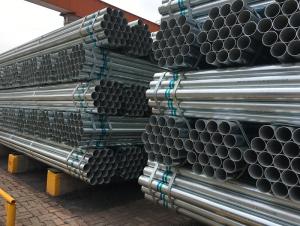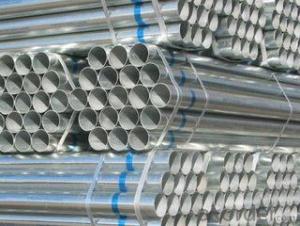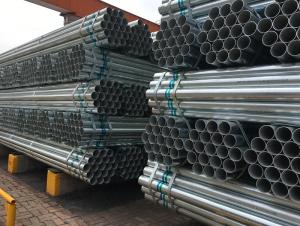Black ERW Steel Pipe 5L 5 CT Welded Black ERW Steel Pipe
- Loading Port:
- Tianjin
- Payment Terms:
- TT or LC
- Min Order Qty:
- 40 m.t.
- Supply Capability:
- 9000 m.t./month
OKorder Service Pledge
OKorder Financial Service
You Might Also Like
1、Structure of Welded Black ERW Steel Pipe 5L 5 CT :
Welded Black ERW Steel Pipe 5L 5 CT is electric resistance welding, the abbreviation for ERW for transporting oil and natural gas vapor liquid objects, can meet the requirements of high and low pressure, the transport in the world with pipe sector accounted for a pivotal position.With sound reputation and high quality , we will offer clients a wonderful business experience.
2、Main Features of Welded Black ERW Steel Pipe 5L 5 CT :
• High strength
• Good visual effect
• Good view and appearance
• Good shape
• Reasonable price
• Small inertia resistance
• Strong heat dissipation ability
3、Welded Black ERW Steel Pipe 5L 5 CT Specification:
Standard | GB, DIN, ASTM ASTM A106-2006, ASTM A53-2007 |
Grade | 10#-45#, 16Mn 10#, 20#, 45#, 16Mn |
Thickness | 1 - 33 mm |
Section Shape | Round |
Outer Diameter | 21 - 610mm |
Place of Origin | Tianjin, China (Mainland) |
Secondary Or Not | Non-secondary |
Application | Hydraulic Pipe |
Technique | Cold Drawn |
Certification | API |
Surface Treatment | factory state or painted black |
Special Pipe | API Pipe |
Alloy Or Not | Non-alloy |
Length | 5-12M |
Outer Diameter | 21.3-610mm |
Grade | 20#, 45#, Q345, API J55, API K55, API L80, API N80, API P110, A53B |
Standard | ASME, ASTM |
2) Specification range:OD:21.3-610mm,WT:6-70mm,length:6-12m or according to the requirement of clients.
3) Excutive standards:GB,ASME API5L.ASTM A 106/A53,Despite of the above standards,we can also supply seamless steel pipe with standard of DIN,JIS,and so on,and also develop new products according to the requirements of our clients!
4) Surface:black lacquered,varnish coating or galvanized.
5) Ends:Beveled or square cut,plastic capped,painted.
6) Packing:bundles wrapped with strong steel strip,seaworthy packing.
4、Packaging & Delivery
Packaging Details: | seaworthy package,bundles wrapped with strong steel strip |
Delivery Detail: | 15-30days after received 30%TT |
5、FAQ of Welded Black ERW Steel Pipe 5L 5 CT :
①How is the quality of your products?
Our products are manufactured strictly according to national and internaional standard, and we take a test
on every pipe before delivered out. If you want see our quality certifications and all kinds of testing report, please just ask us for it.
Guaranteed: If products’ quality don’t accord to discription as we give or the promise before you place order, we promise 100% refund.
6、 Welded Black ERW Steel Pipe 5L 5 CT Images:
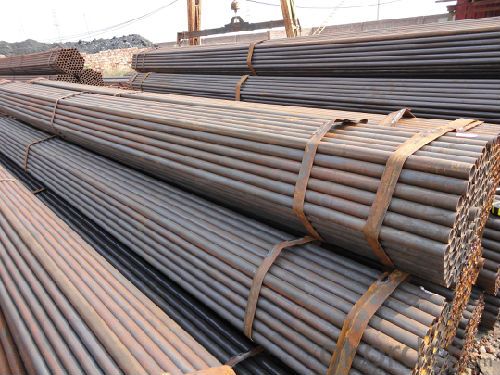
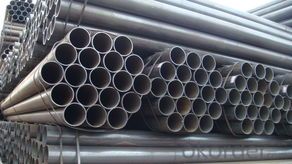
- Q:What is the difference between hot-rolled and cold-rolled steel pipes?
- Hot-rolled steel pipes are manufactured by heating the steel billets or coils to a high temperature, which allows for easier shaping and forming. The hot-rolled process also results in a rougher surface finish and larger tolerances. In contrast, cold-rolled steel pipes are made by rolling the steel at a lower temperature, resulting in a smoother surface finish, tighter tolerances, and improved strength and durability.
- Q:What are the different types of steel pipe supports for seismic applications?
- There are several types of steel pipe supports used for seismic applications, including rigid supports, sway braces, and spring hangers. Rigid supports provide fixed support to the piping system, while sway braces are designed to absorb and redirect seismic energy. Spring hangers, on the other hand, are used to isolate and dampen vibrations caused by seismic activity. These different types of supports are selected based on the specific requirements and characteristics of the piping system and the seismic zone in which it is located.
- Q:What are the different types of steel pipe connections for fire sprinkler systems?
- There are several types of steel pipe connections used in fire sprinkler systems including threaded connections, grooved connections, flanged connections, and welded connections.
- Q:How are steel pipes used in the infrastructure development?
- Steel pipes are widely used in infrastructure development as they provide strength, durability, and versatility for various applications. They are commonly used in the construction of bridges, highways, and buildings as structural elements. Steel pipes are also used in water and sewage systems, as they have excellent corrosion resistance and can withstand high pressure. Additionally, steel pipes are used for transporting oil, gas, and other fluids, making them crucial for the energy industry. Overall, steel pipes play a vital role in the development and maintenance of infrastructure, ensuring its stability and functionality.
- Q:How are steel pipes used in the construction of oil refineries?
- Steel pipes are extensively used in the construction of oil refineries as they are strong, durable, and resistant to corrosion. These pipes are used for various purposes such as transporting crude oil, refined products, and various chemicals within the refinery. They are also utilized in the construction of the refinery's infrastructure, including the fabrication of storage tanks, process equipment, and piping systems that connect different units and sections of the facility. Overall, steel pipes play a crucial role in maintaining the integrity and efficiency of oil refineries.
- Q:Can steel pipes be used for sewer systems?
- Yes, steel pipes can be used for sewer systems. Steel pipes are commonly used for sewer systems due to their durability, strength, and resistance to corrosion. They are able to withstand heavy loads and can be used for both gravity and pressure sewer systems. Additionally, steel pipes provide a long service life, making them a suitable choice for sewer infrastructure.
- Q:Are steel pipes suitable for underground oil pipelines?
- Steel pipes are indeed appropriate for underground oil pipelines. Steel is frequently employed in oil pipelines because of its considerable strength, durability, and resistance to corrosion. Underground oil pipelines encounter different external influences like soil displacement, humidity, and chemicals, but steel pipes can effectively endure these circumstances. Furthermore, by welding steel pipes, a seamless and uninterrupted pipeline can be formed, minimizing the chances of leaks or ruptures. Furthermore, steel pipes have a long history of successful utilization in the oil sector, offering a dependable and cost-efficient method of transporting oil underground.
- Q:How are steel pipes used in the construction industry?
- Steel pipes are commonly used in the construction industry for various purposes such as transporting fluids, structural support, and underground installations. They are utilized in plumbing systems, HVAC systems, and for conveying water, oil, and gas. Additionally, steel pipes are employed in the construction of high-rise buildings, bridges, and other infrastructure projects due to their durability, strength, and resistance to corrosion.
- Q:How are steel pipes used in water transportation?
- Steel pipes are commonly used in water transportation systems as they are strong and durable, allowing for the safe and efficient delivery of water. These pipes are used to create networks that transport water from sources like reservoirs or treatment plants to homes, businesses, and other areas where water is needed. Steel pipes offer excellent corrosion resistance, ensuring the water remains clean and uncontaminated during transport. Additionally, their seamless construction minimizes leakage and ensures a consistent flow of water, making them an ideal choice for water transportation infrastructure.
- Q:How do steel pipes compare to other pipe materials like PVC or copper?
- Steel pipes have distinct advantages over other pipe materials like PVC or copper. Firstly, steel pipes are extremely durable and can withstand high pressure and temperature, making them suitable for various industrial applications. They also have a longer lifespan compared to PVC or copper pipes, reducing the need for frequent replacements. Moreover, steel pipes are highly resistant to corrosion and chemical reactions, ensuring a consistent flow of water or other substances. However, steel pipes are generally more expensive and require skilled labor for installation. PVC pipes, on the other hand, are lightweight, cost-effective, and easier to install, but they may not be as durable or resistant to extreme conditions. Copper pipes are known for their excellent heat conductivity and resistance to fire, but they are more expensive and require more maintenance. Ultimately, the choice between steel, PVC, or copper pipes depends on the specific requirements of the project and the factors of cost, durability, and functionality.
1. Manufacturer Overview |
|
|---|---|
| Location | |
| Year Established | |
| Annual Output Value | |
| Main Markets | |
| Company Certifications | |
2. Manufacturer Certificates |
|
|---|---|
| a) Certification Name | |
| Range | |
| Reference | |
| Validity Period | |
3. Manufacturer Capability |
|
|---|---|
| a)Trade Capacity | |
| Nearest Port | |
| Export Percentage | |
| No.of Employees in Trade Department | |
| Language Spoken: | |
| b)Factory Information | |
| Factory Size: | |
| No. of Production Lines | |
| Contract Manufacturing | |
| Product Price Range | |
Send your message to us
Black ERW Steel Pipe 5L 5 CT Welded Black ERW Steel Pipe
- Loading Port:
- Tianjin
- Payment Terms:
- TT or LC
- Min Order Qty:
- 40 m.t.
- Supply Capability:
- 9000 m.t./month
OKorder Service Pledge
OKorder Financial Service
Similar products
New products
Hot products
Related keywords
